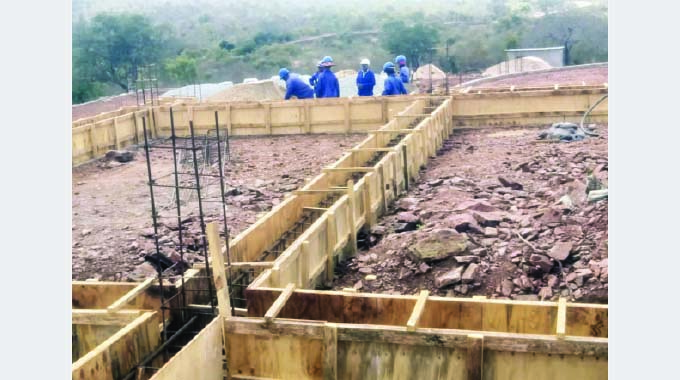Chivi villagers upbeat over GZU Agric Centre

George Maponga in Masvingo
Communities in and around Madyangove in the arid Chivi rural heartland have hailed the Government through the Great Zimbabwe University(GZU) for building an innovation centre that will spearhead research in dryland agriculture, saying the landmark development will engender food security and position their area as new front to stem recurrent droughts caused by climate change in the country.
This comes as the Minister of State for Presidential Affairs and Implementation, Monitoring of Government Programmes Dr Joram Gumbo yesterday toured the fledgling centre and hailed GZU for the project.
The GZU Innovation Centre for Dryland Agriculture in Chivi is being built on 41 hectares of virgin land donated to the institution by Chief Chivi.
Construction started in March last year with funding from Government with the centre billed to undergird the country’s fight against hunger in the face of recurrent droughts occasioned by climate change.
The centre will house research laboratories for crops and animal species suitable for drylands and will also come in handy for adjacent communities in the arid Chivi some of whom will be contracted to produce different crop and animal varieties that thrive in dry regions.
This initiative is in line with Government’s education 5.0 drive, which has positioned institutions of higher learning as hot spots of research and innovation to solve nagging national challenges and engender rural industrialisation.
According to project designers of the centre,it will comprise the “hill complex” that will house labs and an administration blocks with an exhibition centre in the middle.
Below the hill complex is where a grain processing plant is nearing completion while work on structures for road runner poultry project is also ongoing.
Zones for api and aqua culture are also being developed at the centre which is expected to be a citadel for advanced research to ensure a healthy society that consumes nutritious food and is also food secure.
Traditional crops and indigenous animal species will be the focal point of research at the centre. Construction of the centre has brought hopes of a quick socio-economic turnaround for the Madyangove community and greater Chivi.
While others have already started benefiting through employment,many see the innovation centre as the lifeblood of a district for years in the rain shadow of agriculture because of perennial poor rains.
Mr Francis Makayeni of Storm Village in Madyangove expressed hope that the innovation centre would change the agricultural face of Chivi.
“We hope their research here(innovation centre) will help us end the ghost of hunger. We hardly receive good rains here every year and this has been worsened by climate change so we hope they will teach us better farming methods and use of limited water to produce enough food. They will also develop crop and animal varieties that thrive in dry areas,hopefully our lives will change,”said Mr Makayeni.
Mrs Kudzai Nhete of Village 2 in the same area says the Government deserves a pat in the back for trying to find solutions to problems that affect rural communities.
“We have serious problems here of water and most people live in rural areas so we are very happy that GZU is building such a big centre in the midst of a rural area. This will solve some of our problems such that even in times of low rainfall our crops will thrive due to access to expert advice. We must be able to feed ourselves,”she said.
This was also corroborated by Chief Chivi who paid tribute to President Mnangagwa’s administration for taking development to rural areas where the majority of people live.
“We are quite happy with the potential of this place to be the solution to our problems with food.
“Crops and animals hardly do well here because of drought but with the coming of this innovation centre a new window of hope will open,” said Chief Chivi.
“We also hear they will contract our people to grow traditional grains and also introduce better animal species suitable for drylands like Chivi,this will be a new pace in the sphere of food security.”
He also lamented that communities in Madyangove faced food shortages despite abundant irrigation water in nearby Muzhwi Dam.
Ms Nyaradzo Muzondo of Hapazari village near the innovation centre says job creation for locals by GZU should be lauded.
“I can now send my kids to school. I am working here and they gave me a 6-month contract and I am very happy fully knowing that when this project is completed some of us will be supplying grain that will be milled here on top of various other opportunities in agriculture,”said Ms Muzondo.
Dean of GZU’s Gary Magadzire School of Agriculture under which the Innovation Centre for Dryland Agriculture falls, Dr Xavier Poshiwa, disclosed that a variety of traditional grains will be processed at their plant in Chivi.
Dr Poshiwa said the innovation centre will empower surrounding communities with mass production,mass processing and mass consumption at the heart of the innovation drive to positively impact on the local communities and nation at large.
“We will be processing various traditional grains for sale at our grain processing centre and that centre will get the grain from contracted farmers from around here.
“We already have stocked about 20 tonnes of grain that we purchased from contracted farmers and intend to process it,”said Dr Poshiwa.
The grain processing plant will also supply feedstock for the fisheries department being developed at the centre and is expected to be stocked with indigenous fig species.
According to Dr Poshiwa a thriving road runner poultry project was also under development with GZU soon expected to harvest fruits of its apiculture venture at the centre.
Speaking during the tour of the centre, Minister Gumbo hailed the work being done by GZU at the innovation centre for dryland agriculture which he said dovetailed with Government’s Vision 2030.
He noted that the quest by President Mnangagwa’s administration to create a food-secure country would be quickly realised with GZU expected to play a key role in production of nutritious,drought-tolerant and high yielding crop varieties for the nation.
Dr Gumbo also praised GZU authorities for creating jobs for the Chivi rural folk hired as contract workers in the ongoing construction of the centre.
The minister lauded GZU for pushing for gender parity by employing both women and men as contract workers in the project that will also stem the tide of hunger in Chivi.
“I am happy that we have both males and females who are working here in the building of the GZU Innovation Centre for Dryland Agriculture because by doing this we are narrowing that gap between men and women in terms of offering opportunities,”said Dr Gumbo.
“This is the right direction that GZU has taken because it is in sync with what President Mnangagwa wants to see,a self-reliant nation that uses innovation and research to exploit locally available resources to develop.”
GZU Vice Chancellor Professor Rungano Zvobgo says his institution wanted to be the nerve-centre of research on traditional grains and production of new crop and animal varieties that thrive in drylands to ensure food security.
Professor Zvobgo said the advent of recurrent droughts caused by climate change required universities to be citadels of research and innovation to ensure human survival. Besides the Innovation Centre for Dryland Agriculture in Chivi,GZU is also building the Simon Mazorodze School of Medical and Health Sciences in the outskirts of Masvingo City.








Comments